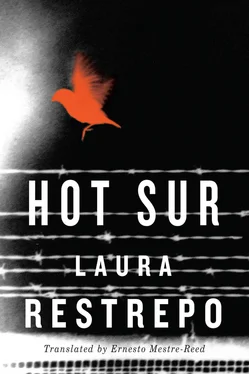“Look me in the eyes, María Paz, promise me you are not going to do anything crazy while I’m gone,” I said, and tried to soothe her anxiety. “It will only be forty-eight hours, forty-eight hours of common sense on your part, that’s all I’m asking. Before you know it, I’ll ride back up to the house on my bike. Think of it like this: I will only be gone this afternoon, tomorrow, and the following morning, just the ride there, the party, and the ride back. Don’t pull any stunts during that time or engage in risky action, just do that for me. Do you understand?”
“What if something happens to you?” she asked, widening her big black eyes so that I wanted to jump into her, plunge into the deep dark water of those eyes, forget about Edith and Ned, to hell with their anniversary, there will be others, but I can’t, just can’t.
Edith would kill me, and if you ask me whom I fear more, Edith or Sleepy Joe, I’d have to say Edith by a few heads.
“Nothing’s going to happen to me.”
“Motorcycles are very dangerous…”
“Now you sound like my father.”
I’m going to leave her plenty of food and a ream of paper, in case she is inspired to write something new. As a temporary farewell, yesterday we made love and took a shower together, me struggling to hold her under the warm stream as she slid down my arms, wet and slippery as an otter, and I brought up her dream again, although she didn’t seem to want to talk about it this time.
“So AIX?” I asked her.
“What?”
“AIX. That’s what you said the creature in your dreams was named, the one that comes out of the cloth vagina. That was it, right, AIX?” And I wrote the letters in the foggy glass of the shower door.
“And what if your father comes up, Mr. Rose?” In spite of all the intimate acts we had shared, to her I continued to be Mr. Rose, her creative-writing teacher; she never called me Cleve.
“My father is going to be in the city. Besides, you know he never comes up here. Why? Will you get bored?”
“How can I get bored, when I am in heaven?”
Her response could not have been more lovely or full of joy. But it concerned me somewhat.
Even though María Paz may not think of it in these terms, she is as locked up and deprived of liberty here as she was in Manninpox.
“Why don’t you start writing your memories over again,” I suggested. “I’ll leave you my laptop, you know how to use it now, or there is paper if you prefer longhand.”
“Ugh, no, Mr. Rose, write everything down from the beginning again, way too long. That’s lost, and it should stay lost. Oh, one little thing before you go,” she said, handing me a small wooden box that she took out of her bag. The box contained Hero’s ashes and the medal of valor given to him in Alaska.
María Paz wanted me to bury the box and keep the medal, but the medal was attached to a blue ribbon that was all stuck to the ashes, so I suggested that we just bury the box with everything inside.
She agreed, and asked that it be buried in a clearing in the woods that was visible from the window. Today, before I leave for Chicago, I will do it in a big way. I am going to give Hero the funeral rites of a hero, a war hero, with Wagner and everything. I’ll burn his name into a small wooden placard and mark the spot of the burial with a makeshift wooden cross. Although on second thought, no name. It would be stupid to do that and then already be well on the road when the police make their daily rounds and investigate. Or what about if my father saw it and was curious about this Hero. What hero? He’d wonder. I will just bury the box, make a quick cross with two pieces of wood, and that’s it — no Wagner or any such other stuff. I’m doing terrible on time. I promised my mother I would not ride the bike at night, and I’m already cutting it close.
A few hours later, I say good-bye to María Paz, my father, and the three dogs. I go to the garage to get a shovel, but I pass by the kitchen for a second to grab a Gatorade and I notice Empera putting out the food for the dogs. She has her iPod headphones on with the music so loud she doesn’t even realize I am standing there, so I pause for a second just to watch her. I have always suspected that she is not much of a dog person. She does not have much interaction with them or much less pet them. On the other hand, she prepares their food bowls with care, adding the appropriate vitamins and supplements to each plate. She doesn’t feel any affection toward the animals, but she also doesn’t mistreat them or neglect them, that’s what I was curious about, and I am pleased with what I see.
“Hi, Empera,” I say to her back, and she almost has a heart attack she is so startled. “It’s a good thing to see you don’t nail dogs to the wall.”
“God Almighty, child, the things you say. Why would I do such an awful thing? Dogs stink to heaven, but they are God’s creatures also.”
“Okay, so tell me what you think about this, Empera, you who know so much about life… What’s going on inside the head of a man who nails a dog to the wall?”
“Nails a dog to the wall?”
“Yes.”
“Well, it’s an atrocity. The only thing a person like that has in his head is madness, and the best thing is to lock him up in an insane asylum. Nail a dog to the wall like they nailed Christ to the cross, that’s heresy. How can you nail such a dirty beast as if it were Lord Jesus? To die nailed is a privilege of the Almighty. That’s heresy, no doubt. As far as I see it, such a person does not believe in God.”
“Thank you, Empera! That’s exactly the kind of thing I was talking about,” I say, and I go back upstairs. “I need to see one thing.”
Suddenly, I have the urge to check this one book, and it has to be now, not when I get back, it has to be right now, even if my mother kills me for being late.
“So,” María Paz asks — she’s by the window, waiting for Hero’s funeral to begin—“not yet?”
“That’s next,” I say kissing her. “I have to jot down something first.”
I know exactly the location of all the books on my shelves, I could pick one out with my eyes closed, and especially if it is Borges, who I am always reading and rereading. But shit, it’s not where it is supposed to be, and immediately one party becomes suspect. I ask María Paz, and she pulls out the book from under the bed. It’s the second volume of the complete works of Borges, and it’s not difficult to find the passage I am looking for, all underlined as it is with my notes on the margin. Page 265. It’s Borges’s commentary on John Donne’s Biathanatos . I read the note I scribbled on the margin a few years ago: “ Biathanatos , one of those improbable and cursed books that every so often cast its shadow over humanity, like the Apocalypse of the false John the Evangelist, or the Necronomicon that Lovecraft conceived but never wrote.”
According to Borges, the purpose of Biathanatos is to expose that the death of Christ was in fact a suicide. Therefore, the entire history of humanity, from Christ and to Christ, is nothing else but the staging of a spectacular and self-induced deicide, accepted by the Son and promoted by the Father, who created the earth and the seas as a setting for the torment of the cross on a stunning cosmic gallows. And if it’s true that Christ died a voluntary death, according to what Borges claims Donne says, and here is Borges’s quote: “This means that the elements and the worlds and the generations of men, and Egypt and Rome and Babylon and Judah were formed from the void to be destroyed. Maybe the iron was specifically created for the nails, the thorns for the crown, and the blood and water for the wound.” There it is; Old Man Borges gets it just right, as always, and before Borges, Donne. And this leads to the corollary, the cherry pie.
Читать дальше












